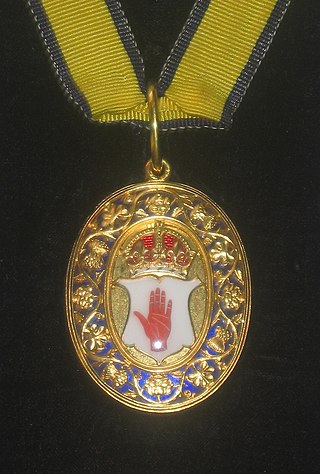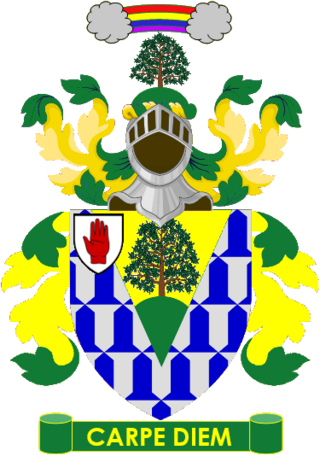
A baronet or the female equivalent, a baronetess, is the holder of a baronetcy, a hereditary title awarded by the British Crown. The title of baronet is mentioned as early as the 14th century; however, in its current usage it was created by James I of England in 1611 as a means of raising funds for the crown.
Baron Dulverton, of Batsford in the County of Gloucester, is a title in the Peerage of the United Kingdom. It was created in 1929 for the businessman Sir Gilbert Wills, 2nd Baronet. He was President of the Imperial Tobacco Company and also sat as a Conservative Member of Parliament for Taunton and Weston-super-Mare. The Wills Baronetcy, of Manor Heath in the Parish of Bournemouth in the County of Southampton, was created in 1897 for his father Frederick Wills. He was a director of W. D. & H. O. Wills, which later merged into the Imperial Tobacco Company, and also represented Bristol North in Parliament as a Liberal Unionist. A member of the wealthy Bristol tobacco importing Wills family, he was the younger brother of Sir Edward Payson Wills, 1st Baronet, a half brother of Sir Frank William Wills Kt., and the cousin of William Wills, 1st Baron Winterstoke. In 1966 the Wills family contained the largest number of millionaires in the British Isles, with 14 members leaving fortunes in excess of one million pounds since 1910, totalling £55 million. As of 2014 the titles are held by the first Baron's grandson, the third Baron, who succeeded his father in 1992.
There have been two baronetcies created for persons with the surname Waller, one in the Baronetage of Ireland and one in the Baronetage of the United Kingdom. One creation is extant as of 2019.
There have been two baronetcies created for persons with the surname Colquhoun ("Cohoon"), one in the Baronetage of Nova Scotia (1625) and one in the Baronetage of Great Britain (1786).
There have been three baronetcies created for members of the Lyle family, all in the Baronetage of the United Kingdom. One creation is extant as of 2010.
There have been three baronetcies created for persons with the surname Harvey, all in the Baronetage of the United Kingdom.

The Wigan Baronetcy, of Clare Lawn in Mortlake in the County of Surrey and Purland Chase in Ross in the County of Hereford, is a title in the Baronetage of the United Kingdom. It was created on 9 March 1898 for Frederick Wigan, a Director of the North London Railway. The presumed 6th Baronet, listed in Debrett's Peerage (2015) as the son of the 5th Baronet, has not successfully proven his succession and is consequently not on the Official Roll of the Baronetage.

There have been two baronetcies created for members of the Waterlow family, both in the Baronetage of the United Kingdom. Both titles are extant as of 2010.

There have been four baronetcies created for persons with the surname Sykes, two in the Baronetage of Great Britain and two in the Baronetage of the United Kingdom. Three of the creations are extant as of 2008.
There have been three baronetcies created for persons with the surname Bellingham, one in the Baronetage of England, one in the Baronetage of Ireland and one in the Baronetage of Great Britain. As of 2014 one creation is extant.
There have been nine baronetcies created for persons with the surname Moore, two in the Baronetage of England, one in the Baronetage of Ireland, two in the Baronetage of Great Britain and four in the Baronetage of the United Kingdom. As of 2014 two creations are extant and one is considered dormant.
There have been six baronetcies created for persons with the surname Newton, three in the Baronetage of England, one in the Baronetage of Nova Scotia and two in the Baronetage of the United Kingdom.
There have been three baronetcies created for persons with the surname O'Neill, two in the Baronetage of Ireland and one in the Baronetage of the United Kingdom.
There have been five baronetcies created for persons with the surname Ward, one in the Baronetage of England, one in the Baronetage of Ireland and three in the Baronetage of the United Kingdom. See also Warde baronets.
There have been three baronetcies created for persons with the surname Everard, one in the Baronetage of Ireland, one in the Baronetage of England and one in the Baronetage of the United Kingdom. Only one creation is extant as of 2010.
There have been three Baronetcies created for the family of Walker, later known as Forestier-Walker. The original title was in the Baronetage of England and the other two in the Baronetage of the United Kingdom. The earliest and the latest are both extinct, but one baronetcy is still extant.
There have been two baronetcies created for persons with the surname Hopkins, one in the Baronetage of Ireland and one in the Baronetage of the United Kingdom.
There have been two baronetcies created for persons with the surname Hughes, one in the Baronetage of Great Britain and one in the Baronetage of the United Kingdom. One creation is extant as of 2008.
There have been three baronetcies created for persons with the surname Duncan, one in the Baronetage of Great Britain and two in the Baronetage of the United Kingdom. All three creations are extinct.




